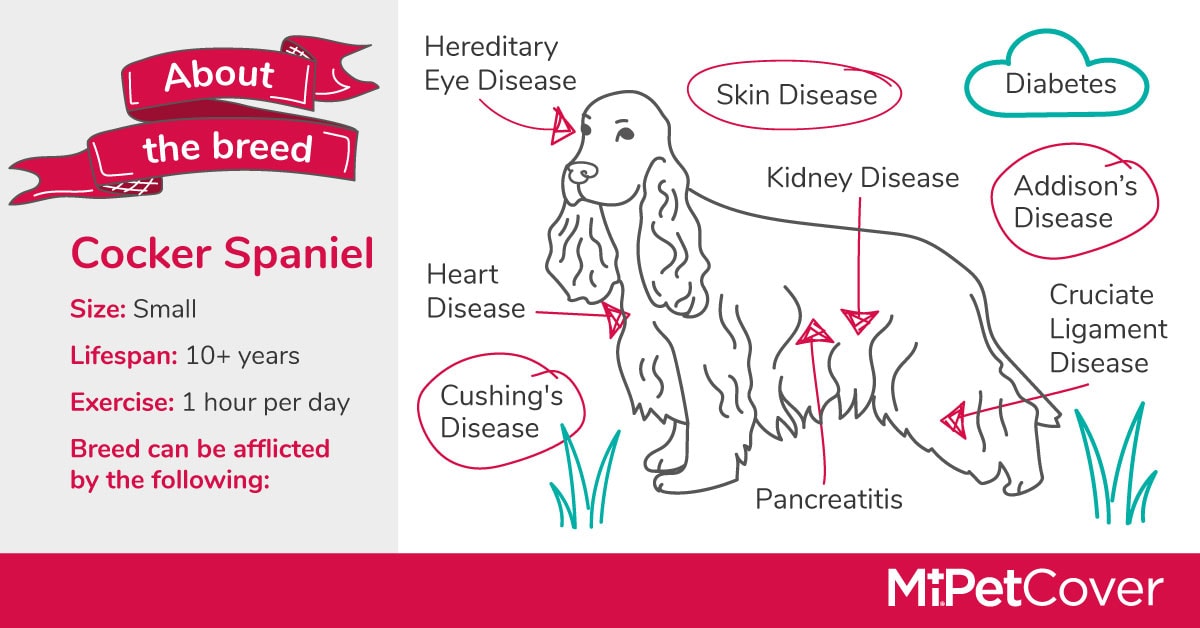Cocker Spaniels: The Energetic and Affectionate Breed of Dog
The Cocker Spaniel is the most popular spaniel within the UK and is one of the most common pet dogs around.
The reasons for this are simple; this is a fun-loving, energetic and affectionate dog.
Their size is seen as an attractive feature, as they aren’t too large and can be accommodated in most homes.

There are two types of Cocker Spaniel: The English and the American. These are two distinct breeds that should not be confused and this article refers to the English spaniel. The American breed is smaller and less active, often used for showing rather than working.
A versatile companion dog, the Cocker Spaniel makes an excellent hunter and can also be used as a sniffer dog. They take well to training and are keen to please their master. Intelligent and biddable, most can be trained to a high standard. These dogs need at least an hour of exercise each day and relish the opportunity to be outdoors.
What health conditions are Cocker Spaniels prone to?
Despite their working background, there are a number of health conditions that plague this breed.

Most live until about 11-12 years old and enjoy a good quality of life. Owners should be aware of the following health conditions:
- Ocular Disease: There are several eye conditions that we should have breeding Cockers tested for. This is to prevent faulty genes being passed down to litters of puppies. There are a total of twelve eye diseases which can be tested for, including progressive retinal atrophy, persistent pupillary membrane and primary glaucoma.
- Atopic Dermatitis: For those of us who own dogs with atopy, we’ll be all too aware of how frustrating this condition can be. Dogs experience skin flare ups after allergen exposure and may show signs such as paw licking, face rubbing and scratching. Secondary skin and ear infections are not uncommon. Indeed, the floppy Spaniel ears make chronic ear infections common. The aim is to identify the dog’s trigger or triggers and to avoid them. When not possible, immunotherapy may be suggested. Ongoing medication, allergy tests and immunotherapy can cost several thousand pounds over a dog’s lifetime.
- Diabetes: An excessive amount of sugar in the blood results in symptoms including weight loss, an insatiable appetite and a perpetual thirst. This endocrine disorder is easily diagnosed as excess sugar is detected in both the blood and the urine. For most Cocker Spaniels, diabetes is managed and not cured. This can mean many years of expensive insulin and check ups. The good news is, with the right ongoing care, most dogs have a good prognosis.
- Dilated Cardiomyopathy: The Cocker Spaniel is one of several dog breeds to be prone to a heart disease called Dilated Cardiomyopathy or DCM. As the heart becomes unable to pump blood efficiently, dogs suffer from episodes of weakness and collapse. We may also see ongoing coughing and shortness of breath. To diagnose DCM, your vet will want to run some tests such as a chest x-ray and echocardiogram. While we can’t cure DCM, Cocker Spaniels tend to have a slowly progressive form of the disease which can be managed with ongoing medication.
- Addison’s Disease: This relatively uncommon disease can cause vague symptoms that wax and wane, making it tricky to diagnose. Affected spaniels may show signs including chronic diarrhoea and vomiting, episodic tremors, lethargy and bloody stools. For some, they are not diagnosed until they become very unwell during an Addisonian crisis. Blood tests can confirm the vet’s suspicion and dogs will be treated with ongoing hormone replacement. As the condition is not curable and dogs require frequent check ups, owners will end up spending hundreds of pounds every year.
A dog breed suited to an outdoors and active lifestyle, the Cocker Spaniel can make a wonderful family pet, just as long as they get enough exercise. These dogs are fast learners and bond strongly with their owner. As there are a number of health conditions they can be prone to, it pays to purchase your pup from a reputable breeder who health screens their dogs.
Looking for Cocker Spaniel Insurance?
As with any pedigree or cross-breed, it’s always a good idea to have a dog insurance policy in place to help with unexpected vet fees.
If you’re introducing a Cocker Spaniel puppy to your home, why now take a look at our four weeks’ free WalkawayCover* created especially for new pups aged 8 weeks to one year?
*Puppy must be between 8 weeks and 1 year old and is subject to a CVS health check. WalkawayCover covers illness and accidents instantly. Not all breeds of dog are eligible.
You might also be interested in…
Get a quote in minutes…

Existing customers
Call now on 0808 164 7999
to discuss your policy with us.
Monday - Friday: 08:00 - 20:00 Saturday: 09:00 - 14:00





 Back
Back
